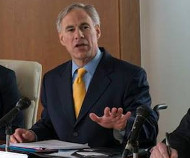Article from: www.thenewspaper.com/news/43/4350.asp
3/4/2014
Texas Attorney General Orders Camera Company To Produce Documents
Unpublished letter ruling from Texas attorney general orders traffic camera company to turn over records.
 Cities and their photo enforcement contractors are often reluctant to respond to freedom of information act requests. Odessa, Texas did its best to suppress a request for emails between city employees and American Traffic Solutions (ATS) by allowing the vendor to argue it was exempt from handing over the documents.
Cities and their photo enforcement contractors are often reluctant to respond to freedom of information act requests. Odessa, Texas did its best to suppress a request for emails between city employees and American Traffic Solutions (ATS) by allowing the vendor to argue it was exempt from handing over the documents.
"Information is excepted from the requirements of [the public disclosure law] if it is information that, if released, would give advantage to a competitor or bidder," states Section 552.104 of the Texas Government Code, which ATS cited.
Under Texas law, the attorney general decides whether an exemption applies or not. Attorney General Greg Abbott also happens to be the Republican nominee for governor against Democrat Wendy Davis in a campaign that already saw red light cameras become an issue in the primary campaign. Abbott is in favor of allowing the public to vote on whether cameras should be used or not, while Davis is an enthusiastic backer of automated tickets. An Abbott deputy ruled against granting the exception for ATS.
"Section 552.104 is a discretionary exception that protects only the interests of a governmental body, as distinguished from exceptions that are intended to protect the interests of third parties," Assistant Attorney General James L. Coggeshall wrote. "Therefore, the city may not withhold any of the information at issue pursuant to that section."
The letter ruling is meant to address only the facts of the request in Odessa.
Often Freedom of information laws have revealed a great deal of embarrassing facts about the way photo ticketing programs operate. In Washington State, freedom of information laws revealed vendor American Traffic Solutions created a fake grassroots group to orchestrate efforts to block a public vote on speed cameras. College Station, Texas was caught spending public money to influence voters to reject a ballot measure banning red light cameras; the voters ignored the publicly funded advertising blitz and voted the cameras down. Houston, Texas sent emails leaning on authors of a study of red light camera effectiveness, resulting in the report being "revised" to show more favorable results. Riverside, California was caught allowing its vendor Redflex Traffic Systems of Australia to issue tickets at an intersection where the yellow time was set to an illegally short 2.5 seconds. A Florida newspaper, the Tallahassee Democrat, was forced to go to court and sue for release of documents. The newspaper won (view ruling).
Byron Schirmbeck has filed several public information requests in his successful effort to force public votes on red light camera use in Texas. One of the documents he received exposed the carelessness with which photo ticket contractors treat private information, as officials disclosed confidential banking information on all ticket recipients. He frequently meets resistance when asking for simple information.
"When a city chooses to outsource law enforcement to corrupt corporations that swear no oath to the Constitution, it should be no surprise when they work hand in hand to hide their methods from the public," Schirmbeck told TheNewspaper.
A copy of the attorney general's letter is available in an 800k PDF file at the source link below.
Source: OR2014-02876 (Texas Attorney General, 2/14/2014)
Permanent Link for this item
Return to Front Page
 Cities and their photo enforcement contractors are often reluctant to respond to freedom of information act requests. Odessa, Texas did its best to suppress a request for emails between city employees and American Traffic Solutions (ATS) by allowing the vendor to argue it was exempt from handing over the documents.
Cities and their photo enforcement contractors are often reluctant to respond to freedom of information act requests. Odessa, Texas did its best to suppress a request for emails between city employees and American Traffic Solutions (ATS) by allowing the vendor to argue it was exempt from handing over the documents.